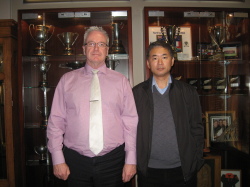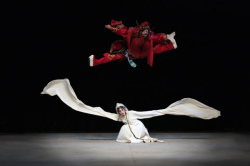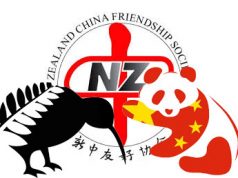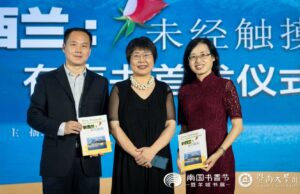AT OUR NEXT BRANCH MEETING
The Aroha Quartet
will present
“Our Stories and Our Music”

Haihong Liu: Violin l Beiyi Xue: Violin ll Zhongxian Jin: Viola Robert Ibell: Cello
Founded in 2004, the Aroha String Quartet has firmly established its place at the forefront of the New Zealand music scene, being well known to audiences around New Zealand for their passionate musicality and impressive technique.
Haihong Liu, Beiyi Xue and Robert Ibell are members of the New Zealand Symphony Orchestra while the violist Zhongxian Jin enjoys a varied career as a teacher and free-lance musician.
Their eclectic repertoire reflects their versatility, including works ranging from traditional Chinese folk music to western classical and avant-garde contemporary repertoire. The quartet has toured extensively throughout New Zealand, including several tours for Chamber Music New Zealand. In 2010 they attended ISA International Chamber Music Summer Academy in Reichenau, Austria followed by a series of concerts and workshops in Canton, China. Plans for 2011 include concerts throughout New Zealand, the performances in Huntington Chamber Music Festival invited by Musica Viva Australia, and the recording of Gillian Whitehead’s work Moon, Tides and Shoreline for Atoll Records.
Aroha (R-oh-HA) is the Maori word for love. The original members of the quartet were all new New Zealanders and they chose the name because of their love for their new homeland and the music which had brought them here.
Wednesday, 15 June 2011, at 5.45 pm
Connolly Hall, Guildford Terrace, off Hill Street, Thorndon, Wellington. (Car park up Guildford Tce beside Hall)
An optional Chinese buffet meal, supplied by the Fujiyama Café, will follow the meeting at 7 pm. Orders for the $11.00 meal (please pay at the door) will be taken up till 6 pm. If you think you may be arriving late, please let the Secretary know in advance.
ALSO COMING UP THIS MONTH
11, 18 June 3:15pm Mandarin Corner, 20 Kelburn Parade
22 June 6:00pm The Chinese Communist Party 1921-2011
23 June 7:00pm Film Evening, 101 Wakefield St
25 June 3:15pm Mandarin Corner, 20 Kelburn Parade
See below for further details.
NEW MEMBERS – A warm welcome to Ann Verboeket.
REPORT ON LAST MEETING (from George Mills)
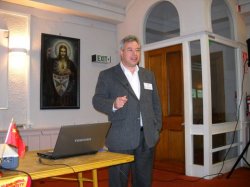 Dr Paul McDonald, Senior Lecturer at the Management School of Victoria University in Wellington, gave an intriguing talk titled “Maoism versus Confucianism: Competing Ideological Influences on Modern Chinese Business Leaders”. Noting the growing role of China on the world stage, including specifically in global business, Dr McDonald highlighted the resulting necessity to understand what defines China’s business leaders today, and into the future. Are these leaders influenced primarily by Maoism or Confucianism or, in some cases, both? Detailing the academic work that supported his research, sharing a brief history of the two strains of the aforementioned thoughts, cleverly incorporating the use of paintings to illustrate his major propositions, and providing an outline of several current Chinese business leaders on either side of the divide, Dr McDonald’s presentation was thought-provoking, highly informative, and entertaining. Whether engaged with China for the sake of business, academic or government work, or personal enjoyment & fulfilment, one is constantly affected by the decisions of the country’s leadership, in both the public and private sectors. By examining the ideological beliefs that underlie these leaders, Dr McDonald’s presentation left us wiser, and better informed. Dr McDonald has already presented his findings to an audience in Shanghai, and his work on this subject will be published later in the year.
Dr Paul McDonald, Senior Lecturer at the Management School of Victoria University in Wellington, gave an intriguing talk titled “Maoism versus Confucianism: Competing Ideological Influences on Modern Chinese Business Leaders”. Noting the growing role of China on the world stage, including specifically in global business, Dr McDonald highlighted the resulting necessity to understand what defines China’s business leaders today, and into the future. Are these leaders influenced primarily by Maoism or Confucianism or, in some cases, both? Detailing the academic work that supported his research, sharing a brief history of the two strains of the aforementioned thoughts, cleverly incorporating the use of paintings to illustrate his major propositions, and providing an outline of several current Chinese business leaders on either side of the divide, Dr McDonald’s presentation was thought-provoking, highly informative, and entertaining. Whether engaged with China for the sake of business, academic or government work, or personal enjoyment & fulfilment, one is constantly affected by the decisions of the country’s leadership, in both the public and private sectors. By examining the ideological beliefs that underlie these leaders, Dr McDonald’s presentation left us wiser, and better informed. Dr McDonald has already presented his findings to an audience in Shanghai, and his work on this subject will be published later in the year.
MEETING DATES FOR THE REST OF 2011
July 17, Sunday 2.30pm: Professor James Liu, “Chinese Indigenous Psychology”
August 17, Wednesday 5.45pm: Dr Han Xi, “Exciting Developments in the Study of Chinese in Schools”
September 21, Wednesday 5.45pm: HE Mr Xu Jianguo, PRC Ambassador (topic to be confirmed)
October 19, Wednesday 5.45pm: Mr Chris Elder, “Reflections on China”
November 16, Wednesday 5.45pm: Mr David Feickert, “Mine Safety in China: Lessons for New Zealand”
MAOGUSI DANCE OF THE TUJIA MINORITY IN WEST HUNAN
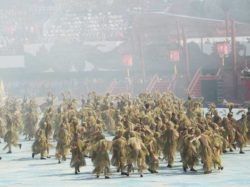 Maogusi is an old form of dance popular among the Tujia people living the west of Hunan province of China. It is performed to remember their ancestors’ achievements in cultivation, fishing and hunting. Maogusi means “Hunters covered with hair” in Tujia language. According to the legend, a Tujia young man went down the mountain to learn farming skills and came back to teach the skills to the local people in the form of dancing. Since he came back so hurriedly that his clothing was torn by brambles, he had to cover himself with couch grasses. In order to remember him, the Tujia people will cover themselves with couch grasses and perform the “Maogusi” dance at the festivals such as wish redeeming and ancestor worshiping. The number of dancers in the Maogusi performance varies from 10 to 20. One plays the role of Maogusi in Tujia clothes to represent the ancestor, and others play the offspring. All the dancers are covered with couch grasses, with a straw hat worn and bare feet. The performance begins with the Waving Dance (Huishou Wu), and then Maogusi dancer will suddenly appear on the stage, and, at the same time, the Waving Dance will stop immediately to give the stage to the “Ancestor”. The performance of Maogusi will last for 6 nights, during which period, actors should always speak and sing in the Tujia language and dance with bold and unconstrained movements. Maogusi is a kind of original dramatic dance with personae, dialogues and a simple plot. Its unique dance has attracted the attention of both domestic and foreign dancing artists and is praised as the living fossil of the history of the Tujia ethnic group. Maogusi was included into the List of National Intangible Cultural Heritage in 2006. [from cultural-china.com]
Maogusi is an old form of dance popular among the Tujia people living the west of Hunan province of China. It is performed to remember their ancestors’ achievements in cultivation, fishing and hunting. Maogusi means “Hunters covered with hair” in Tujia language. According to the legend, a Tujia young man went down the mountain to learn farming skills and came back to teach the skills to the local people in the form of dancing. Since he came back so hurriedly that his clothing was torn by brambles, he had to cover himself with couch grasses. In order to remember him, the Tujia people will cover themselves with couch grasses and perform the “Maogusi” dance at the festivals such as wish redeeming and ancestor worshiping. The number of dancers in the Maogusi performance varies from 10 to 20. One plays the role of Maogusi in Tujia clothes to represent the ancestor, and others play the offspring. All the dancers are covered with couch grasses, with a straw hat worn and bare feet. The performance begins with the Waving Dance (Huishou Wu), and then Maogusi dancer will suddenly appear on the stage, and, at the same time, the Waving Dance will stop immediately to give the stage to the “Ancestor”. The performance of Maogusi will last for 6 nights, during which period, actors should always speak and sing in the Tujia language and dance with bold and unconstrained movements. Maogusi is a kind of original dramatic dance with personae, dialogues and a simple plot. Its unique dance has attracted the attention of both domestic and foreign dancing artists and is praised as the living fossil of the history of the Tujia ethnic group. Maogusi was included into the List of National Intangible Cultural Heritage in 2006. [from cultural-china.com]
MANDARIN CORNER 汉语角 3.15pm – 4.30pm Saturdays during school terms
Victoria University of Wellington, Seminar Room, 20 Kelburn Parade. Gold coin donation.
Open to all ages, all levels. One to one or small groups.
Three sessions in June 2011 (excluding Queen’s Birthday weekend): 11 June: Wu Ji Chuan (无极拳), 18 June: Collection (收藏), 25 June: Chinese Paper Cutting (中国剪纸).
Contact: Ellen Yang, 473-7558, 027-4756888, [email protected].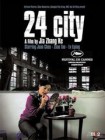
CHINESE FILM 中国电影 Date: Thursday 23 June Time: 7.00pm – 9:30pm
Venue: Committee Room One, Wellington City Council, 101 Wakefield Street (please note the venue and date change, we have moved back to Wellington City Council meeting room.)
24 City (Chinese: 二十四城记/二十四城記; literally: The Story of 24 City) is a 2008 film directed and co-written by Chinese filmmaker Jia Zhangke. The film follows three generations of characters in Chengdu (in the 1950s, the 1970s and the present day) as a state-owned factory gives way to a modern apartment complex. The film was also known as The Story of 24 City during production.
The first Confucius Classroom attached to the Confucius Institute of VUW was established at Rotorua Boys’ High School earlier this year. It recently held a 10 day Chinese Photograph Exhibition starting 20th May and on behalf of the Confucius Institute, Dr CHEN Ben attended the opening ceremony. Dr Chen commends that Rotorua Boys’ High School is rather unique in NZ, for its incomparable insight on future relationship development between China and NZ which is fully demonstrated by Principal Mr Grinter’s bold decision of making Chinese the only foreign language program in its curriculum and it has even become a compulsory course for the top class of Year 9 & 10 students. In addition, RBHS also works closely with sister schools in China, sending students to experience Chinese culture on a yearly basis. It has set a great example for many other schools in NZ for the promotion of the Chinese language and culture, and most importantly of the friendship between the two countries. Dr Chen is pictured with Rotorua Boys High School Principal Chris Grinter.
Dr Chen Ben is an Associate Professor of Xiamen University, the partner University of VUW for the establishment of the Confucius Institute of VUW. Dr Chen holds a Ph. D. in World History (American History in particular) and is currently the Chinese Director of the CIVUW. He has behind him more than 20 years experience teaching English in China and also gained rich experience working outside China. He was part of a bilingual program at Sussex University in the UK in 2004; a visiting scholar in the History Dept of Columbia University in the U.S. during 2006-2007 and also taught Chinese at Confucius Institute of Middle East Technical University, Ankara, Turkey which is another CI of Xiamen University, during 2009-2010. In Feb 2011, he came to NZ, acting as the Chinese Director of CIVUW, where he is to experience another unique culture and contribute to the Chinese-NZ Friendship development for years to come.
NZCFS 2011 NATIONAL CONFERENCE – WELLINGTON MAY 27-29 (from President Bernie Richmond)
The NZCFS Annual Conference was held in Wellington over the weekend of 27-29 May 2011 hosted by the Wellington Branch. The Theme “China & New Zealand: The Next Decade”
The opening on Friday evening by the Deputy Mayor of Wellington, Councilor Ian McKinnon was preceded by a Drinks & Nibbles hour after which the Wellington Branch President welcomed the delegates, the National President Eric Livingstone spoke and the Deputy Mayor opened the conference. Some 60 people attended. Mr John Forster of The Hong Kong Shanghai Bank, the main conference sponsor, also spoke.
The keynote address, titled “NZ-China Relations: Beyond the Four Firsts”, was given by Professor Xiaoming Huang, Director of the NZ Contemporary China Research Centre.
Saturday saw the attendance of 80 people representing all 15 branches to hear The National President’s address and presentations by eight speakers over a wide range of topics. These presentations will be available on the Society website should you wish to read them.
We were honoured by a Delegation of four from the CPAFFC (Youxie) in Beijing led by Mr Qing Boming. Mrs Pat Tauroa of the NZ China Maori Friendship Charitable Trust also attended and addressed the conference.
The Conference Celebration Banquet on Saturday night was attended by over 100 delegates, members and friends. Also present were the Charge d’Affaires of the Chinese Embassy, Mr Cheng Lei, his wife Qiao Li and Embassy staff and a representative of The Ministry of Foreign Affairs & Trade.
Light entertainment interspersed the various courses of the Chinese Banquet by the OrientExpress Band ably led by Dr Luo Hui of the Wellington Confucius Institute at Victoria University who had earlier in the afternoon addressed the conference on “Building Relations Between China and New Zealand”.
Sunday saw an early start for the Annual General Meeting of the Society and election of the National President and National Executive Officers for 2011-2012.
Reports on the activities of the Society and Branches over the past year were tabled at the meeting.
I have received many complimentary emails etc. from attendees expressing appreciation for the caliber of the speakers and variety of topics presented and thanks for one, if not, the best Annual Conference of the Society.
All in all a very successful conference was hosted by the Branch and I would compliment and express my personal thanks to all of the Wellington Branch members who so willingly gave a great deal of their time to make this conference the success it was.
SUBSCRIPTION RENEWALS FOR 2011 (from Treasurer Doreen Launder)
June marks the middle of the year and sadly there are at least fifty 2011 Subscription Renewals yet to be paid. This is a serious matter and I, as Treasurer, regret the necessity to ask those who have not paid to please do so by the end of June. Rent and newsletter publication costs have increased markedly over the last two years and it is important to keep our finances and cash flow in order.
Our meeting rooms facilitate high level presentations and meaningful friendship and community building activities within our Branch. Members’ participation in these meetings is greatly appreciated and enjoyed by all, while at the same time attracting new members. Alongside this, the Wellington Branch produces an excellent monthly newsletter that is a key communication and information document. It would be very sad to see any reduction in the quality of these services that are at the heart and joy of our local branch. Further, though, please treat your subscription as a means of supporting the aims of the society, rather than as something from which you expect to receive an identifiable return
For those who have not yet paid, perhaps payment slipped your mind. Please do try to pay by the end of June. As an addendum to this I extend thanks to the over 100 members who have paid already. My contact details are at the end of this newsletter if you need a renewal form.
PERSPECTIVES ON THE CHINESE ECONOMY FROM A VETERAN ASIAN BUSINESS HAND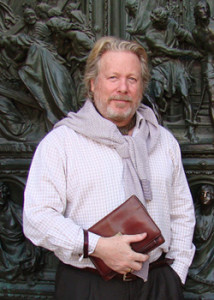
(contributed by George Mills)
In comments distributed online on 09 May by asiabriefingmedia.com, Dezan Shira & Associates principal, and veteran Beijing-based China business hand, Chris Devonshire-Ellis (pictured right), provided candid insight into the current state of the Chinese economy, its future prospects, and the related political causes and ramifications. I summarize (with some editing) his comments, below.
Ellis believes China’s economy is slowing, and that rather than correcting the economy’s problems now, the current Chinese leadership is waiting out their time, and will pass these problems on to the next generation of leaders (set to take over in 2012), thereby suggesting economic problems well into 2013 and beyond. Ellis is sceptical of China’s GDP growth figures, concerned about the amount of bank debt in the system, and doubtful that China will be able to have its fiscal stimulus incentives returned. With wages in China rising, and overall costs of business rising faster than profits, Ellis notes that profit margins for foreign companies are shrinking. While Ellis says he is not yet “bearish” on China, he does express caution, offering the following:
Development opportunities in inland regions of China abound, but they cost more in terms of logistics, and increased local competition. China’s political system has enabled the country’s spectacular economic development to date, but problems portend. Specifically, and for example, when talking about China’s development model, Indian politicians wish they too could push through infrastructure development absent from any public discourse as China’s leaders do. In India, however, the democratic process slows things down. So the absence of this process works to China’s advantage. That said, China’s way leaves a lot do be desired. China has not engaged with institutions, and the government runs everything, including 90 percent of the country’s businesses. That is not good for intuition or fresh input, and China is now at a stage where it needs both. However, it has not put such engagement mechanisms in place, and that is a disadvantage that is now coming home to the Chinese. Democracy can be tedious at times, but it does permit full debate about the way forward, with institutions and the people having a say, and an investment, in the outcome. India is using its democracy in a positive manner, albeit sometimes painfully, but people and institutions have a say in the process. That is healthier than closing yourself off from advice. China will likely overcome these issues, but it could be doing a lot better. The economic slowdown need not be happening.
On the question of whether “socialism with Chinese characteristics” has run its course, Ellis notes “No, because that too is evolving, it is a moving target. However, in some cases, there appears to have been little reform in China. The government today has merely replaced the Imperial Civil Service of a century ago. They are not answerable, and politicians in China regard themselves as Mandarins. They will not talk to journalists or tolerate any public debate. There is a real danger that they are being seen as increasingly aloof. In democratic countries in the region, politicians are more open. In both India and even Mongolia, you can have public debates with the prime minister. In China, if you were impertinent enough to do that, you would get into trouble, or even locked up if you criticized the PM in public. Nonetheless, socialism in China needs more reformists like Prime Minister Wen Jiabao. But currently, it seems as if the hard liners are in control, and it does not feel comfortable. Maybe this is to do with the fact a new leadership is coming into place. We will have to see whether the new generation of leaders are tougher, or prepared to be more relaxed than the last. That is the problem with China; it is politically uncertain in the longer term (italics added).”
CHINA CONFIDENT ON NUCLEAR PLANS DESPITE JAPAN CRISIS
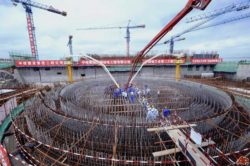 With the threat of radiation leaks following damage to nuclear power plants in Japan due to the recent earthquake, other countries have begun to rethink their nuclear power policies. Yet it appears inevitable that China, as a major energy consumer, will continue to develop nuclear energy. The government has pledged to produce 15% of its energy by 2020 from non-fossil fuel sources. Currently, less than 10% of the country’s energy consumption comes from such sources. Coal is still the main source of China’s generating capacity, accounting for around 80% of total electricity generation. It is estimated that the proportion of coal-fired power in the country’s energy mix will decrease to 70% in 2020, while other sources including hydroelectric power, natural gas, bio-energy, wind power and nuclear energy will increase. Nuclear power will account for 6% of the energy mix by 2020. China’s 12th five-year plan says the government wants to develop nuclear energy on a secure basis, and the main bases will be in costal and central regions. The extent of China’s reliance on imports for its energy needs is about 10%, while for crude oil it is as high as 50%. As cutting reliance on fossil fuels is China’s principal energy policy, nuclear power is still a promising way for China to serve its rising energy demands. Developing new energy sources is not easy. The Three Gorges Dam carries the risk of landslides and major ecological damage, while wind and solar power are not stable or significant enough to fill the gap. Despite the unfolding nuclear crisis in Japan, China can keep developing nuclear energy as the country is big enough to place its plants outside highly-populated areas. Furthermore, China’s third-generation plants are more secure than Japan’s 30-year-old second-generation plants. Japan’s damaged nuclear power plant used second-generation technology. By contrast, the third-generation AP1000 nuclear power technology the Chinese government is promoting allows the nuclear power system to eliminate heat during an emergency by natural forces such as gravity, rather than backup power. There are 13 functioning nuclear power plants in China, 26 plants under construction, and with approval granted for 32 new plants to be built. (By Vincent W. Li, 17 March 2011 www.wantchinatimes.com)
With the threat of radiation leaks following damage to nuclear power plants in Japan due to the recent earthquake, other countries have begun to rethink their nuclear power policies. Yet it appears inevitable that China, as a major energy consumer, will continue to develop nuclear energy. The government has pledged to produce 15% of its energy by 2020 from non-fossil fuel sources. Currently, less than 10% of the country’s energy consumption comes from such sources. Coal is still the main source of China’s generating capacity, accounting for around 80% of total electricity generation. It is estimated that the proportion of coal-fired power in the country’s energy mix will decrease to 70% in 2020, while other sources including hydroelectric power, natural gas, bio-energy, wind power and nuclear energy will increase. Nuclear power will account for 6% of the energy mix by 2020. China’s 12th five-year plan says the government wants to develop nuclear energy on a secure basis, and the main bases will be in costal and central regions. The extent of China’s reliance on imports for its energy needs is about 10%, while for crude oil it is as high as 50%. As cutting reliance on fossil fuels is China’s principal energy policy, nuclear power is still a promising way for China to serve its rising energy demands. Developing new energy sources is not easy. The Three Gorges Dam carries the risk of landslides and major ecological damage, while wind and solar power are not stable or significant enough to fill the gap. Despite the unfolding nuclear crisis in Japan, China can keep developing nuclear energy as the country is big enough to place its plants outside highly-populated areas. Furthermore, China’s third-generation plants are more secure than Japan’s 30-year-old second-generation plants. Japan’s damaged nuclear power plant used second-generation technology. By contrast, the third-generation AP1000 nuclear power technology the Chinese government is promoting allows the nuclear power system to eliminate heat during an emergency by natural forces such as gravity, rather than backup power. There are 13 functioning nuclear power plants in China, 26 plants under construction, and with approval granted for 32 new plants to be built. (By Vincent W. Li, 17 March 2011 www.wantchinatimes.com)
THE CHINESE COMMUNIST PARTY TURNS 90: 1921-2011
Members of the Branch are encouraged to consider registering for an upcoming course at VUW on the Chinese Communist Party with Dr Pauline Keating, a Senior Lecturer in History at Victoria University. Here is how the course is described: “The Chinese Communist Party turns 90 this year. Will it still be in government when it celebrates its centenary? This course explores the question of Party legitimacy today by examining its 90-year history. Founded in July 1921, the Communist Party built its power in the 1930s and 1940s by means of popular movements. Was it ever really a “people’s party”? Did Marxist ideology ever have popular appeal? Should the big mass mobilisations of the Maoist era be seen as evidence of popular support for the Party? And how connected with “the people” is the post-Mao Party?”
Date: Wednesdays 22, 29 June and 6 July Time: 6pm-8pm
Venue: Pipitea Campus. Course No: 11C023A
Fee: $70 ($63 Early Bird fee if booked on or before Wednesday 8 June).
For full information and to enrol visit www.victoria.ac.nz/CCEShortcourses/ and view the Course Catalogue.
ASIAN SHORT STORY COMPETITION
The inaugural NZ Society of Authors Asian Short Story Competition is now open for entries.
As the national body supporting writers in New Zealand, our organisation is keen to promote Asian writing and offer an opportunity for Asian writers to showcase their work. We are hoping this will be the beginning of a conversation between Asian writers and the New Zealand Society of Authors.
Entry is open to New Zealand permanent residents who are Asian or of Asian ethnicity. Short stories will be in English, and the theme is open. Stories will ideally contain some Asian content, though not necessarily be set in Asia. The minimum length of entries is 2,500 words, and the maximum length of entries is 3,500 words. There is a total of $5,000 in cash prizes. First prize: $3,000. Second: $1,000. Third: $500.
A shortlist of 5 will be announced on 21 October. Winners will be announced at a function in Auckland during November 2011. We will be providing assistance to the three prize winners to cover any costs incurred (return domestic flights and one nights? accommodation) in attending the awards ceremony.
The judging panel comprises Sue Gee, Renee Liang and Stevan Eldred-Grigg. The competition deadline is 30 August 2011. For more information and forms please email [email protected] or visit the website: www.authors.org.nz
Kun Qu Opera – 昆曲 was proclaimed in 2001 by UNESCO as a Masterpiece of the Oral and Intangible Heritage. It is one of the oldest forms of opera originating back to the end of the Yuan Dynasty (1271-1368). It is still in existence in China and has witnessed a revival since 2004 with the Chinese government devoting 10 million Yuan per year to revive the art form. Most of the money was intended to collect librettos and ancient materials, stage new plays and train professionals. A Kunqu Opera museum was opened in 2003 in Suzhou, in Jiangsu Province. The exhibits include masks, costumes, manuscripts and ancient instruments. Kun Opera is distinct in its rhythmic patterns and has greatly influenced other forms of traditional opera such as Sichuan and Beijing operas. The name is attributed to the birthplace of this art form – Kun Mountain (昆山) near Suzhou in today’s Jiangsu province. Kunqu Opera went through several stages of development and was reformed in the Ming Dynasty (1368-1644) by Wei Liangfu during the reign of Emperor Jiajing. It is known for its soft arias, mild music, high literary value of the texts, elegance and grace. The songs were written in seven to ten-character lines and three types of musical instruments were generally used – string instruments, bamboo flutes and drums and clappers. The particular instruments used include dizi (a horizontal bamboo flute which plays the lead part), the xiao (a vertical bamboo flute), the sheng (a mouth organ) and the pipa (a plucked string instrument with a fretted finger board). Kun Opera has 12 roles and a prescribed system of acting and movement. The key and representative works of Kun Opera are: The Peony Pavilion, Palace of Eternal Youth, Fifteen Strings of Coins, Love at First Sight and Escorting Jingniang Home.
NEW NEWSLETTER CONTRIBUTORS
We have several new members on the newsletter team, and we shall be providing some biographical notes about these hard-working contributors over the next few newsletters. This month we offer you George Mills, whose name you may have noticed already.
George Mills joined the Newsletter editing team in early 2011, and has been a member of the Wellington Branch of the NZCFS since late 2009. George is the Director of Wellington-based Pan-Pacific Strategic Investments Ltd., an investment consulting firm specializing in political, commercial and cultural analysis for investors looking to pursue commercial ventures in the wider Asia region (including in China), with a strong emphasis on Clean Technologies. George has lived in and travelled throughout the world, including Europe, the Middle East, Africa and Asia. George is married and has three young children, attending Wellington area schools.
IDIOM OF THE MONTH (from Ana Baide)
刻苦耐勞 (kè kǔ nài láo) To suffer hardship and persevere in toil.
飲水思源 (yǐn shuǐ sī yuán) When drinking water, think of its source.
What it means is that one should always be hard working and persevering in all things, at all times. And whatever we do, we should always remember and be grateful to all those who have helped us in one way or another, in ways big and small.
BOOK CORNER (from Douglas Day)
Non Fiction
China Ghosts, by Jeff Gammage, 2007
Jeff Gammage is a staff writer at The Philadelphia Inquirer, where he often writes about adoption.
This is a revealing account of Gammage, going to China with his wife to adopt their two daughters; one daughter from Hunan in 2002, the other from Gansu in 2004. He writes thoughtfully about the stress of adoption, the special requirements of a China adoption, and China’s ‘One Child Policy’.
Fiction
My Life as Emperor, by Su Tong, trans. by Howard Goldblatt, Faber and Faber, 2005
Coming from one of the most noteworthy among contemporary Chinese writers is this story set in China’s imperial past.
Narrated in the first person by its protagonist, the emperor of the Xie Empire, My Life chronicles the eventful life of a young ruler of an imaginary empire in no particular historical time. My Life is beautifully translated by Howard Goldblatt, a veteran scholar and prolific translator of contemporary Chinese literature.


